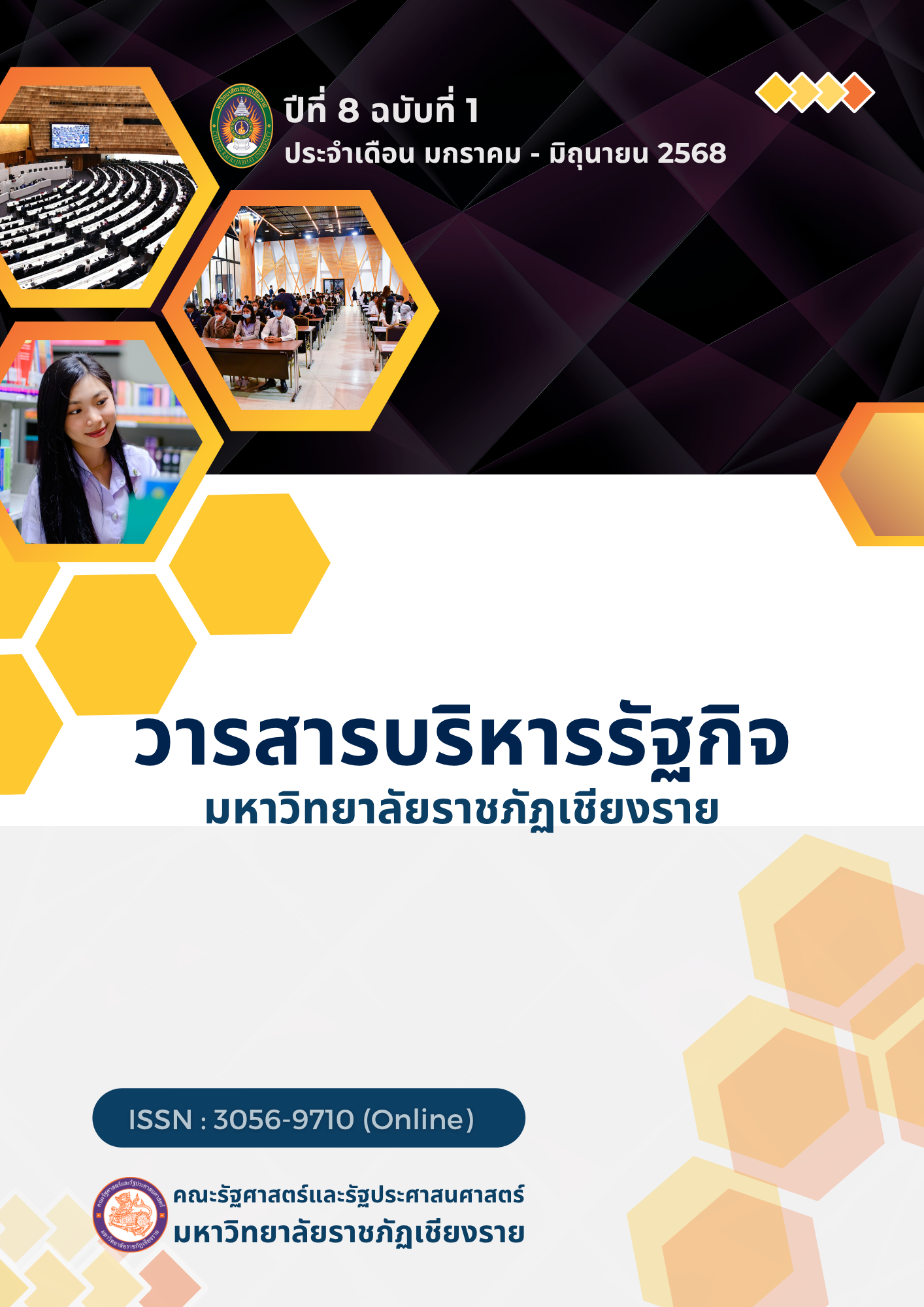Improving Service Quality that Affects Tourists' Revisit Intention in the Digital Age: A Case Study of the Rajamangala University of Technology Trang Aquarium
Main Article Content
Abstract
This research aims to (1) examine the level of service quality development that influences tourists’ revisit intention in the digital era, using Rajamangala Trang Aquarium as a case study, and (2) investigate the factors in service quality development that affect tourists' revisit intention. The study sample comprised 400 Thai tourists who visited the Rajamangala Trang Aquarium. Data collection was conducted using a structured questionnaire, which was validated for content validity through an Index of Item-Objective Congruence (IOC), with values ranging from 0.67 to 1.00, and for reliability using Cronbach’s Alpha, yielding an overall reliability coefficient of 0.950. Data analysis was performed using descriptive statistics and inferential statistics, employing a stepwise multiple regression analysis.
The findings reveal that (1) the overall level of service quality development influencing revisit intention in the digital era was rated at the highest level, and (2) the development of service quality in terms of online experience, offline experience, psychological and social factors, and integrated experiential engagement positively influenced tourists’ revisit intention. Among these, offline experience had the most significant impact, while the integration of digital and offline experiences played a crucial role in enhancing convenience and fostering tourists’ emotional connection with the aquarium, ultimately strengthening their intention to revisit in the future. This study offers practical recommendations, including developing digital platforms for promotion, organizing interactive online activities, and training staff in technological competencies, which can be applied in service strategy planning to effectively enhance visitor engagement and revisit intention.
Article Details
References
นครินทร์ วัฒนารักษ์. (2565). นวัตกรรมทางธุรกิจและการจัดการองค์กรในยุคดิจิทัล. กรุงเทพฯ: สำนักพิมพ์แห่งจุฬาลงกรณ์มหาวิทยาลัย.
ปิยารัตน์ ตรีรัตนประคอง. (2566). ปัจจัยที่มีอิทธิพลต่อพฤติกรรมความตั้งใจของนักท่องเที่ยวชาวไทยในแหล่งท่องเที่ยวทางธรรมชาติทางภาคใต้ของประเทศไทย. วิทยานิพนธ์ปริญญามหาบัณฑิต, นครปฐม: มหาวิทยาลัยมหิดล.
วรรณพร ผาสุข. (2565). การตลาดเชิงประสบการณ์ที่ส่งผลต่อการกลับมาท่องเที่ยวซ้ำในเขตพื้นที่เมืองพัทยา. สืบค้นเมื่อ 10 มีนาคม 2567, จาก https://buuir.buu.ac.th/ handle/1234567890/5429
วุฒิชาติ สุนทรสมัย. (2564). การวิเคราะห์ปัจจัยและจำแนกกลุ่มนักท่องเที่ยวตามภาพลักษณ์แหล่งท่องเที่ยวจังหวัดชลบุรีเพื่อเลือกตลาดเป้าหมายที่ตั้งใจกลับมาเที่ยวซ้ำ. วารสารวิชาการมนุษยศาสตร์และสังคมศาสตร์, 15(1), 45-67.
สุวรรณี ทองเจือ. (2563). ปัจจัยด้านคุณภาพการบริการและผลต่อความตั้งใจกลับมาเยี่ยมชมซ้ำในพิพิธภัณฑ์สัตว์น้ำในประเทศไทย. วารสารนวัตกรรมและการจัดการ, 10(3), 45-55.
สำนักงานพิพิธภัณฑ์สัตว์น้ำราชมงคลตรัง. (2566). รายงานประจำปีการดำเนินงานพิพิธภัณฑ์สัตว์น้ำ. สืบค้นเมื่อ 10 มีนาคม 2567, จาก https://nrei.rmutsv.ac.th/ruts/aquarium/
Best, J. W., & Kahn, J. V. (1993). Research in education (7th ed.). Allyn and Bacon.
Hair, J. F., Risher, J. J., Sarstedt, M., & Ringle, C. M. (2019). When to use and how to report the results of PLS-SEM. European Business Review, 31(2), 2-24.
Kazmi, S. H. A., Yousaf, M., & Ali, R. (2020). The impact of integrated digital services on revisit intention: Evidence from experience-based tourism. International Journal of Hospitality Management, 89(102545).
Khoo, C. H. (2022). Service experience design in the digital era. Routledge.
Kim, J., & Lee, S. (2023). Revisit intention in cultural learning centers: A comprehensive model. Tourism Management, 94, 104-120.
Moon, J., & Armstrong, K. (2020). Understanding digital tourists: Behavioral patterns and loyalty formation. Journal of Tourism Research, 45(2), 85–100.
Sekaran, U. & Bougie, R. (2016). Research Methods for Business: A Skill-Building Approach (7th Edition). Wiley & Sons, West Sussex.


